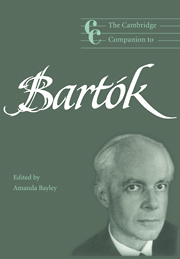Introduction
Published online by Cambridge University Press: 28 September 2011
Summary
Béla Bartók's compositional output defies straightforward categorization. He is often bracketed with Hindemith and Stravinsky as a composer of non-serial music during the first half of the twentieth century, rather than with the twelve-tone composers of the Second Viennese School. Yet what sets him apart from all these composers is his interest in folk music and the assimilation of folk- and art-music influences in his works. His lifelong commitment to folk music, not just its collection and transcription but also its analysis and systematic classification, is unsurpassed.
This book brings together many leading exponents in Bartók research and endeavours to provide a concise yet comprehensive insight into current thoughts and ideas surrounding the historical, cultural and musical appreciation of his works. Even fifty-five years after the composer's death important documents continue to be translated from Hungarian to English, some of which challenge long-standing interpretations of cultural and political issues surrounding the music. The diversity of approaches to Bartók research is demonstrated in this volume through historical, performance-orientated and analytical perspectives within the organization of material into three main sections: ‘Contexts’, ‘Profiles of the music’ and ‘Reception’.
For Bartók there were a great many political and social issues that underlay his musical philosophy. Lynn Hooker opens the first section of this book with a presentation of the political, social and cultural circumstances that surrounded Bartók in Hungary from the end of the nineteenth to the beginning of the twentieth century. This extends to include the eminent musicians and literary scholars with whom the composer shared some important affinities during this rapidly changing modern world.
- Type
- Chapter
- Information
- The Cambridge Companion to Bartók , pp. 1 - 4Publisher: Cambridge University PressPrint publication year: 2001



